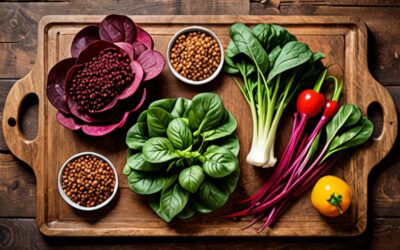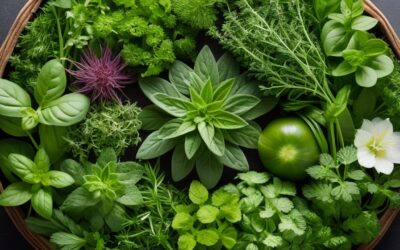Sustainable Eating: How To Make A Positive Impact On The Planet

Sustainable Eating: How To Make A Positive Impact On The Planet
Understanding Sustainable Eating
Sustainable eating. It’s all about making food choices that are not only good for you, but also good for the planet – it means being aware of how your diet impacts the environment and trying to minimize harm.
As more folks tune into the planet’s needs, sustainable eating is really catching on—it’s all about picking food that’s kind to both our bodies and Mother Earth.
Eating sustainably isn’t just about going for organic or local food; it’s a whole mindset shift, considering everything from how the food is grown to its packaging and even what happens to waste.
The Environmental Impact of Food Production
Growing our food and getting it to the table takes a toll on Mother Nature, from using up precious resources for farming and rearing animals, to belching out greenhouse gases during delivery and processing stages.
So, the United Nations points out that about a third of all greenhouse gas emissions are actually down to our food system.
Greenhouse gas emissions aren’t just from factories and cars, but they’re also pumped out when forests are cut down for farmland, when cows belch up methane, and during the energy-guzzling steps of processing and packaging our food.
Pivoting to a plant-rich diet is like giving Mother Earth a break – it significantly reduces greenhouse gases, dials back pollution from animal farming and crops, and helps prevent further deforestation.
The food we get from animals is a major problem—it’s churning out greenhouse gases like there’s no tomorrow, bulldozing forests at an alarming rate, and seriously messing with our water systems.
Piling on the fruits, vegetables, legumes and whole grains could be our ticket to a seriously reduced carbon footprint.
Benefits of Sustainable Eating
Adopting sustainable eating habits not only benefits the planet, but also our own health and well-being.
Eating more veggies and less meat isn’t just good for you, it can help dodge scary stuff like heart problems, sugar issues, and even some cancers.
Usually, a diet focused on plants packs less of that bad stuff – you know, like saturated fats and cholesterol – but crams in more good things like fiber, vitamins, and minerals.
Here is a rewritten version of the content in a single sentence, aiming for clarity, concision, and an appropriate tone: Sustainable food choices support local farmers and promote fairness while benefiting health.
When we buy food from local farmers, it not only helps their small businesses flourish but also cuts down on the carbon footprint due to less transportation. Eating sustainably helps balance resource allocation and slashes waste.
Choosing to consistently shop for locally sourced, seasonal foods not only aids smaller farmers but also significantly reduces your personal carbon emissions.
Starting to eat sustainably might seem like a mountain to climb, but you’ll be amazed at the big difference small tweaks can make. Here are some tips to get started:
1.Choose whole, unprocessed foods: Processed foods often require more energy and resources to produce, and they tend to come packaged in single-use plastics. Opt for fresh fruits and vegetables, whole grains, and minimally processed foods whenever possible.
2.Reduce meat consumption: As mentioned earlier, livestock farming has a significant environmental impact. Think about dialing back on your meat intake, maybe by hopping on board with trends like “Meatless Mondays” or giving plant-based options a go.
3.Support local farmers: Buying locally sourced foods not only supports your local economy, but also reduces the carbon emissions associated with long-distance transportation. Visit farmers markets or join a community-supported agriculture (CSA) program to access fresh, seasonal produce.
4.Minimize food waste: Food waste is a major issue globally, contributing to greenhouse gas emissions and wasted resources. Sketch your meal plans, make sure you’re storing food correctly and think outside the box with those leftovers to slash waste.
5.Choose sustainably sourced seafood: Overfishing and destructive fishing practices have depleted fish populations and damaged marine ecosystems. Explore options for seafood that’s responsibly harvested, endorsed by respected entities like the Marine Stewardship Council.
Sustainable Eating on a Budget
Contrary to popular belief, sustainable eating doesn’t have to break the bank. While organic and locally sourced foods may be more expensive in some cases, there are still ways to make sustainable choices on a budget.
A savvy move would be to zero in on fruits and veggies that are in season; not only are they easier on your wallet, but their environmental footprint is also smaller.
Moreover, if you’re savvy about it, getting your groceries in larger quantities and mapping out your meals beforehand can be a real game-changer; not only will you save some cash, but you’ll also cut down on chucking out uneaten food.
Consider joining a local food cooperative or starting a community garden to access fresh, affordable produce.
Sliding more plant-powered proteins into your daily grub is another savvy play for your budget.
Legumes, such as lentils, beans, and chickpeas, are not only affordable but also rich in nutrients and environmentally friendly. Playing around with various veggie-based meals can be a blast and easy on the wallet.
The Role of Organic and Locally Sourced Foods in Sustainable Eating
Organic and locally sourced foods are often associated with sustainable eating. Choosing organic means backing a system that puts emphasis on nurturing the earth, supporting diverse life forms, and using nature’s own solutions for fertilization and keeping pests at bay.
Opting for organic grub doesn’t just get you tasty bites; it’s a vote for less fake stuff in our soils and healthier, happier planet vibes.
Likewise, choosing to buy food that’s sourced locally comes with a bunch of perks. Buying local cuts down on carbon footprints, throws a lifeline to our neighborhood farmers, and makes sure we’re noshing on crisp, in-season veggies and fruits. Neighborhood farms will quite often utilize more economical farming practices
Sustainable Eating and Reducing Food Waste
Food waste is a significant issue in our modern society, with around one-third of all food produced worldwide going to waste.
Food waste exacerbates climate change. When food goes bad in landfills, it kicks out methane—a greenhouse gas packing a serious punch for our climate.
Here is a rewritten version of the content in a single sentence, aiming for clarity and concision in an essay-appropriate tone: Reducing food waste is a vital part of sustainable eating practices.
Planning meals, buying only what we need, and properly storing leftovers are simple steps that can make a big difference.
Also, by turning food scraps into compost, you’re not just reducing landfill waste – you’re also making some top-notch soil for your garden.
Sustainable Eating in Restaurants and When Dining Out
Eating sustainably doesn’t have to be limited to home-cooked meals. Many restaurants and food establishments now offer sustainable options on their menus.
When you’re out for a meal, try to choose eateries that make it a point to use local ingredients, offer veggie meals, or adhere to ethical seafood guidelines.
Controlling portions and skipping extra packaging also let you make more sustainable picks. Opt for tap water instead of bottled water and bring your own reusable containers for leftovers. Making green choices truly counts.
Conclusion: Making a Positive Impact Through Sustainable Eating
At the point when we pick what to eat, we should recollect our decisions influence the planet, so pursuing sustainable choices helps all.
With simply a few careful changes like decreasing food size and dumping pointless wrapping, we can be important for positive change in food service practices.
Also, trading bottled water for tap and bringing our own vessels for extras is a simple beginning! So, we’re not just promoting healthier habits on a broader scale—we’re also dialing up the positivity by dining green.
Wrapping things up, eating sustainably isn’t just good for you—it’s like giving Mother Earth a big thumbs-up.
Getting the lowdown on how our grub choices impact Mother Earth, opting for greener alternatives, and dialing back on trash can seriously slash our carbon footprints while backing a more equitable and robust food chain.
Shifting to eco-friendly eating might need a bit of change in our day-to-day, but trust me, the perks make it worth the hustle.
Choosing to eat green is like a double win – it’s not just an ace move for our planet, but also akin to hitting the health lottery.
Every mindful choice we make about what’s on our plate today is a step towards shaping a healthier and more sustainable world for us, as well as the generations yet to come.
Keep in mind, each time you eat is a chance to make an impact. Let’s get serious about our food choices, folks – each meal is a chance to give the planet a helping hand; small steps towards sustainability can make for one mighty green revolution.
Call To Action: Seize this chance to positively influence our planet’s health by making more sustainable food choices – every meal is a step towards greener living.
Jump on the green eating bandwagon today and start transforming our world one meal at a time. We should gather as one, going for the future where everybody is dealt with reasonably and our activities continuously show effort to sustainability.
RELATED POSTS
Unlocking the Secret of Iron-Rich Foods in Vegetarian Diets
Embracing a vegetarian diet not only decreases the probability of chronic diseases like heart disease, diabetes, and particular cancers but similarly establishes a healthy weight management scheme.
The Best And Interesting Foods For Optimal Brain Health
Being passionate about maintaining optimal brain health has always been intrigued by the impact of nutrition on cognitive function. Our cerebral mechanism, governing our perceptions, sentiments and conducts, is undeniably the body’s most indispensable entity.
From Thin to Thick: The Best Herbal Supplements for Hair Growth
When it comes to hair growth, many of us are on a never-ending quest for thicker, fuller locks. There is a plethora of products on the market claiming to promote hair growth, but one natural and effective solution to consider is herbal supplements.
FOLLOW DISCOVERY BLOGGER









0 Comments